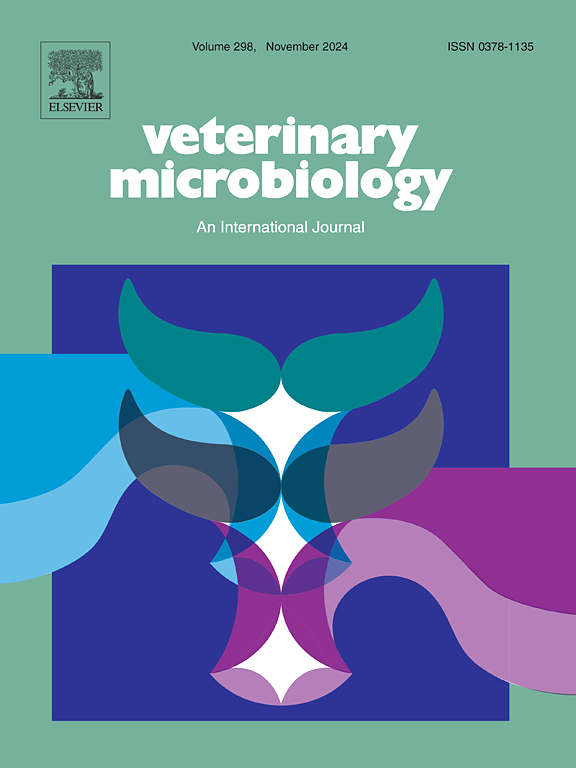伪狂犬病毒EP0蛋白通过自噬作用靶向cGAS和STING降解。
IF 2.7
2区 农林科学
Q3 MICROBIOLOGY
引用次数: 0
摘要
cGAS-STING轴是启动抗病毒免疫反应的中心dna传感通路,但病毒逃避这一防御系统的机制仍不完全清楚。在这里,我们鉴定了伪狂犬病毒(伪狂犬病毒)的早期蛋白EP0作为病毒毒力因子,伪狂犬病毒是α疱疹病毒亚家族的一员。在机制上,PRV EP0通过自噬-溶酶体途径促进cGAS和STING的降解,从而抑制下游TBK1和IRF3的磷酸化,从而抑制cGAS-STING介导的先天免疫。这种降解严格依赖于EP0功能域的结构完整性。值得注意的是,cGAS或STING的缺失显著增强了ep0缺陷PRV的复制。总之,这些发现确定了PRV EP0是cgas - sting介导的先天免疫的关键拮抗剂,为开发更有效的疫苗和抗病毒疗法提供了见解。本文章由计算机程序翻译,如有差异,请以英文原文为准。
Pseudorabies virus EP0 protein targets cGAS and STING for degradation through autophagy
The cGAS–STING axis is a central DNA-sensing pathway that initiates antiviral immune responses, yet the mechanisms by which viruses evade this defense system remain incompletely understood. Here, we identify the early protein EP0 of pseudorabies virus (PRV), a member of the Alphaherpesvirinae subfamily, as a viral virulence factor. Mechanistically, PRV EP0 suppresses cGAS–STING–mediated innate immunity by promoting the degradation of both cGAS and STING via the autophagy–lysosome pathway, thereby inhibiting downstream phosphorylation of TBK1 and IRF3. This degradation is strictly dependent on the structural integrity of EP0's functional domains. Notably, deletion of cGAS or STING significantly enhances replication of EP0-deficient PRV. Together, these findings establish PRV EP0 as a key antagonist of cGAS–STING–mediated innate immunity, offering insights that may inform the development of more effective vaccines and antiviral therapies.
求助全文
通过发布文献求助,成功后即可免费获取论文全文。
去求助
来源期刊

Veterinary microbiology
农林科学-兽医学
CiteScore
5.90
自引率
6.10%
发文量
221
审稿时长
52 days
期刊介绍:
Veterinary Microbiology is concerned with microbial (bacterial, fungal, viral) diseases of domesticated vertebrate animals (livestock, companion animals, fur-bearing animals, game, poultry, fish) that supply food, other useful products or companionship. In addition, Microbial diseases of wild animals living in captivity, or as members of the feral fauna will also be considered if the infections are of interest because of their interrelation with humans (zoonoses) and/or domestic animals. Studies of antimicrobial resistance are also included, provided that the results represent a substantial advance in knowledge. Authors are strongly encouraged to read - prior to submission - the Editorials (''Scope or cope'' and ''Scope or cope II'') published previously in the journal. The Editors reserve the right to suggest submission to another journal for those papers which they feel would be more appropriate for consideration by that journal.
Original research papers of high quality and novelty on aspects of control, host response, molecular biology, pathogenesis, prevention, and treatment of microbial diseases of animals are published. Papers dealing primarily with immunology, epidemiology, molecular biology and antiviral or microbial agents will only be considered if they demonstrate a clear impact on a disease. Papers focusing solely on diagnostic techniques (such as another PCR protocol or ELISA) will not be published - focus should be on a microorganism and not on a particular technique. Papers only reporting microbial sequences, transcriptomics data, or proteomics data will not be considered unless the results represent a substantial advance in knowledge.
Drug trial papers will be considered if they have general application or significance. Papers on the identification of microorganisms will also be considered, but detailed taxonomic studies do not fall within the scope of the journal. Case reports will not be published, unless they have general application or contain novel aspects. Papers of geographically limited interest, which repeat what had been established elsewhere will not be considered. The readership of the journal is global.
 求助内容:
求助内容: 应助结果提醒方式:
应助结果提醒方式:


